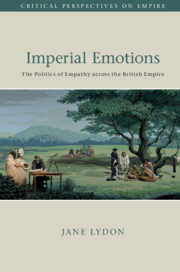Book contents
- Imperial Emotions
- Critical Perspectives on Empire
- Imperial Emotions
- Copyright page
- Dedication
- Contents
- Figures
- Acknowledgements
- Introduction: Emotions and Empire
- 1 Children of Empire: British Nationalism and Colonial Utopias
- 2 Colonial ‘Blind Spots’: Images of Frontier Conflict
- 3 Australian Uncle Tom’s Cabins
- 4 The Homeless of Empire: Imperial Outcasts in Bleak House
- 5 Christian Heroes on the New Frontier
- 6 Charity Begins at Home: Philanthropy, Magic Lantern Slides and Missionary Performances
- 7 The Republican Debate and Popular Royalism: ‘a Strange Reluctance to Actually Shout at the Queen’
- Bibliography
- Index
3 - Australian Uncle Tom’s Cabins
Published online by Cambridge University Press: 30 September 2019
- Imperial Emotions
- Critical Perspectives on Empire
- Imperial Emotions
- Copyright page
- Dedication
- Contents
- Figures
- Acknowledgements
- Introduction: Emotions and Empire
- 1 Children of Empire: British Nationalism and Colonial Utopias
- 2 Colonial ‘Blind Spots’: Images of Frontier Conflict
- 3 Australian Uncle Tom’s Cabins
- 4 The Homeless of Empire: Imperial Outcasts in Bleak House
- 5 Christian Heroes on the New Frontier
- 6 Charity Begins at Home: Philanthropy, Magic Lantern Slides and Missionary Performances
- 7 The Republican Debate and Popular Royalism: ‘a Strange Reluctance to Actually Shout at the Queen’
- Bibliography
- Index
Summary
From its publication, the powerful affective charge of Harriet Beecher Stowe’s best-selling antislavery novel, Uncle Tom’s Cabin; or, Life Among the Lowly (1852) crossed national and cultural borders, and had an enormous impact on the abolitionist debate. Australian audiences retained considerable sympathy for UTC’s depiction of slavery, however, such audiences generally failed to recognise the parallels between the plight of African-American slaves, and of Indigenous Australians. Nonetheless, UTC was sometimes evoked to draw attention to the tragedy of Aboriginal child removal under assimilation policies, now known as the Stolen Generations. UTS also reveals how metropolitan domestic ideals were applied to an expanded imperial world, a sentimental investment in the home and family that was the basis for the colonial project of assimilation. UTC’s colonial application raises again the long-standing debate between those who argue that literature helps to cultivate a more compassionate society, and those who believe that empathy masks complicity with oppressive practices. I argue that despite the manipulation, re-working and stereotypical devices that limit the impact of sentimental narratives, we must distinguish between diverse contexts of reading and social action, and their political malleability, focusing on their relationship to contemporary political discourse.
Keywords
- Type
- Chapter
- Information
- Imperial EmotionsThe Politics of Empathy across the British Empire, pp. 77 - 99Publisher: Cambridge University PressPrint publication year: 2019

